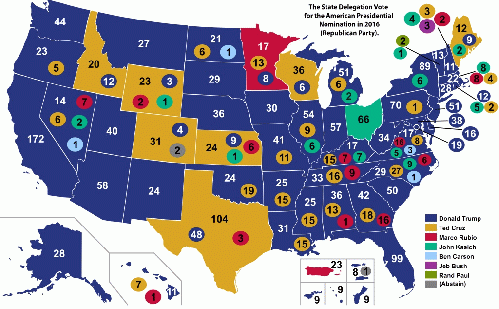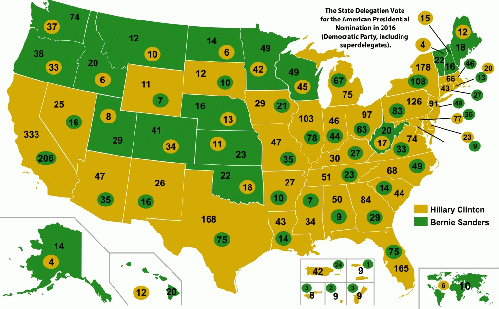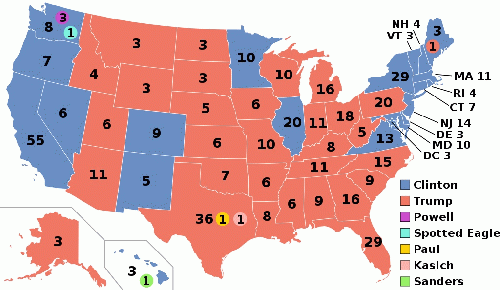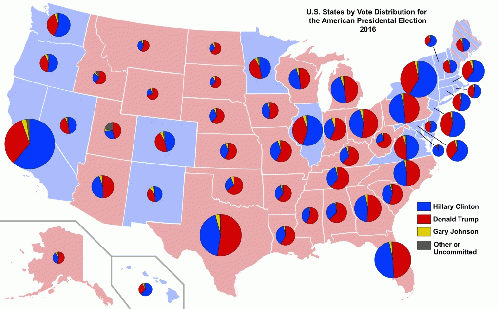"It was the best of times, it was the worst of times, it was the age of wisdom, it was the age of foolishness, it was the epoch of belief, it was the epoch of incredulity, it was the season of Light, it was the season of Darkness, it was the spring of hope, it was the winter of despair, we had everything before us, we had nothing before us, we were all going direct to Heaven, we were all going direct the other way--in short, the period was so far like the present period, that some of its noisiest authorities insisted on its being received, for good or for evil, in the superlative degree of comparison only." --Charles Dickens 1859
Let's explore a tale of two parties. Why are they so foolish and use the "winner-takes-all" system in each state in Presidential elections? Is it that they can't do fractions? In my previous article about the Electoral College we established that Americans can in fact do fractions. To prove it here are the results from the 2016 US Republican and Democratic Party presidential primary elections:
2016 Republican Primaries
Republicans allocate 2472 delegates to their convention in 56 primary contests by proportion of popular vote in each state. Note that seven different candidates in total received delegates. In Nevada, New Hampshire, Virginia, and Maryland five different candidates received delegates. The Republicans can be very democratic and even do fractions. Here's the result from Virginia for example. Look at the wisdom of the proportions. Each candidate is allocated delegates exactly according to the popular vote. Fractions are rounded up or down according to normal rules of math. I'm incredulous. Who said Republicans can't do science and math?
2016 Democratic Party Primaries:
Democrats can also do fractions, but ironically are not quite so democratic as the Republicans, because they have "super" delegates that do what the party bosses tell them to do. To illustrate, here's the map of 2016 "pledged" (elected) delegates followed by the map of total delegates (including superdelegates):
2016 Democratic Primaries-Total Delegates (Includes Superdelegates)
Look carefully at Wyoming, Michigan, Indiana, and Rhode Island. The color magically turned from green (Sanders) to yellow (Clinton). This is just one of the ways that Clinton stole the nomination from Bernie (see Donna Brazile's book and Wikileaks for the rest). 'Twas a season of darkness. Take Michigan for example:
Voters gave Bernie 67 delegates and Hillary 63. Delegates are allocated according to proportion of the vote, although there's something fishy because 49.7% of 130 is 64.6 so that would be 65 delegates for Sanders, not 67. Ok, well Democrats can sort of do fractions. Bernie still wins Michigan. It was the spring of hope, but then the winter of despair set in. After "unpledged" superdelegates are allocated (10 to Hillary, 0 to Bernie) Clinton gets 73 and Sanders still has 67. Hillary steals Michigan, thwarting the will of the people. As the DNC would say, she stole it fair and square. "We don't have to follow the will of the people and can choose the candidate in a cigar-filled back room if we want to." They actually said something like this in the court case challenging the result! Now do the math: Allocating 147 total delegates by proportion of the vote, Sanders would have gotten 73 and Hillary 71. Three would have been uncommitted. Not so democratic these Dems.
Now let's look at the 2016 general election. 304 electoral votes to Trump, 227 to Clinton:
Winner takes all the electoral votes in almost every state. In the superlative degree of foolishness, that is beyond belief. The only exceptions are Maine and Nebraska that allocate electoral votes by congressional district. One Trump elector in Maine came from voters in that district according to the rules. All the other candidates who received electoral votes were by "faithless electors", a form of civil disobedience by electors against the electoral college. These are people who do not follow the dictates of the "winner-takes-all" system of allocating electoral votes in their state (since it's so stupid) and vote for someone else instead. Colin Powell had 3 defectors in Washington State, and Spotted Eagle, Ron Paul, John Kasich, and Bernie Sanders each received one faithless electoral vote. More power to them. But how would it look if electoral votes were allocated by proportion of the vote instead of "winner-takes-all"? Every state is divided:
I already calculated the results if electoral votes were allocated by proportion of the vote:
Trump: 247, H. Clinton: 252.5, others: 38.5 = 538 total
Trump: 45.9%, H. Clinton: 46.94%, others 7.16%
Clinton wins, Popular vote and Electoral college match.
But look at Gary Johnson's little yellow slices of the pies, like daggers pointed at the heart of the two-party monopoly. That will give you a hint about this sordid story.
Take California for an example. Hillary got 61.7% of the vote and got all 55 electoral votes. But why? More foolishness.
When we see the results of California we can now understand why Republicans and Democrats suddenly lose the ability to do fractions in general elections. They insist on winner-takes-all, or as they say in Britain with their snobby horse-racing analogy: "First-past-the-post". Hillary would have gotten 34 and Trump 17 by proportion of the vote. You can see from the yellow slices in the pie charts above that Libertarian Gary Johnson got substantial votes in many states. In California, Gary Johnson deserved two electoral votes and Jill Stein deserved one if allocated by proportion of the vote. All the other candidates combined also earned one.Democrats and Republicans have done everything they can to prevent other parties from competing in elections including blocking ballot-access, denying media coverage, arresting third-party candidates (Ralph Nader, Jill Stein), hijacking the debates from the League of Women Voters, smearing them, and a variety of other dirty tricks. Libertarians and Greens still managed to get enough votes to earn electoral votes in California and some other states if electoral votes were allocated the same way as delegates in primary elections.
But that is death to the two-party system, and the republicrat, demopublican duopoly party cannot let that happen. This explains why they can do fractions in the primaries, but suddenly lose the ability to do them in general elections. Neither party wants any one else competing. Is the temporary loss of math ability a thing? Fractions are inconvenient for the two-party system. It could be the best of times for multiparty democracy, but for now it is the winter of despair. The two parties are going straight in the opposite direction from heaven.
(Article changed on March 24, 2019 at 04:00)
(Note: You can view every article as one long page if you sign up as an Advocate Member, or higher).










